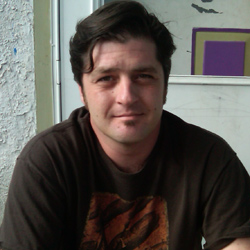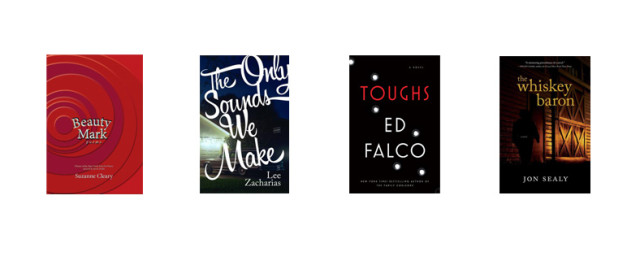Interview by Rebecca Landau
Sonja Condit’s debut novel, Starter House, was published by William Morrow Books, a subsidiary of Harper Collins, in December 2013 and received strong reviews, with Kirkus describing it as “good, scary fun, packed with emotional nuance.” The novel follows a young couple as they move into a charming fixer-upper in South Carolina ready to start a family. Little do they know the house has a reputation as place that “eats babies,” and the further along in her first pregnancy wife Lacey becomes, the more in danger she and her unborn child are to the same sinister presence that has tormented generations at 571 Forrester Lane.
*****
Is there a horror trope you’d be happy to see go away?
There are some things that have always bothered me about haunted houses, specifically. First, the houses are usually ancient, and huge, and obviously evil. Why would anyone live there? You should know better. The 19th century robber baron’s mansion with doors to nowhere, and a torture chamber imported from France—you shouldn’t try to make it into a bed-and-breakfast. The house that used to be a mortuary, and still has vats of formaldehyde in the basement—that’s not a good place to raise your family. The house in Starter House has a history, but it’s a common, ordinary house, newly renovated, and not that old. It was important to me that it be an ordinary house. That’s why it’s identical to the house next door.
I understand that Starter House is based on an actual house in your neighborhood that often is vacant, or only can keep tenants for short periods. What is the status of the house now?
It’s currently empty. Two months ago, a real estate company cleaned it up, scraped the oak saplings out of the gutter, and painted inside, but nobody has bought it, even though the sign says, “Down Payment $100.”
In a horror novel like this, how did you approach maintaining and building suspense for the reader? Were you ever scared that a scene wasn’t scary enough and in revision, amp up the intensity, or feel a scene might be too much, and tone down the horror elements?
It’s hard for me to know the effect. After all, everyone reacts differently. Whenever I could make something worse for the characters, I did. I never went the other way. Some readers tell me they were terrified, others say it wasn’t all that scary, so this is a reaction the writer can’t control. I was going for creepy-scary, not gory-scary, and creepiness is a very personal reaction.
Without spoiling too much, what would you say was your favorite chapter to write and why? By extension, was there a character in whose point of view you most enjoyed spending time?
I don’t have a favorite chapter, but I enjoyed writing Lex Hall because his mind was so different. The two other point of view characters, Lacey and Eric, see themselves as being very different in terms of background and character, but truly they are more alike than they think. They’re the same age, they grew up in the same state, and they were educated in the same schools—after all, they met in college. Lex being so different allowed me to triangulate Lacey and Eric’s relationship; Lex has his own relationship with each of them. Even though Lex and Lacey don’t meet until the end, they do have a relationship throughout the story, beginning with the similarity of their names. Everything Lex does is a reflection of something Lacey does. She breaks a window to get into the house; he breaks a window to get into his mother-in-law’s apartment. She can’t wash the dog; he can’t wash the baby. The smell of crayons reminds her of the first day of school, and later, the smell of crayons reminds him of something he can’t remember. This was fun to write.
As a teacher yourself, can you speak to why you made two of your characters teachers: Harry (who also is a musician like you) and Lacey?
Lacey being a teacher comes down to reasonableness. If you truly believed your house was haunted, wouldn’t you find a way to get out of it? It has to be reasonable for the characters to stay. Writers spend a lot of authorial energy locking their characters into the bad place. For instance, in The Shining, Stephen King spends hundreds of pages locking his people into the haunted hotel, first economically, and then emotionally, and then physically with the snowstorm, and even then he had to break the woman’s spine to keep her in there. How could I do that in a suburb? The only way was to make Lacey a person who could not be afraid of a child, somebody whose personality and training and self-image were all about teaching and helping. Harry is a violin teacher so that he can have children coming in and out of his house, and so he can be home in the daytime. That was a logistical choice.
Is there a theme you’d love to address but have not yet explored? Is there a type of writing (a different genre, even a different narrative style) you would love to try but have not yet explored?
I don’t know about themes. For me, the theme develops out of the characters and their situation. I greatly admire writers who can create enormous, multi-volume works, but probably don’t have it in me. My attention span is too short. Three hundred pages, yes. Three thousand, no. Sometimes people ask me if I’m writing a sequel, but no, those characters have done their work.
Now that the book has been out for awhile, do you have any insights for aspiring authors on the process of publishing the book, the experience of promoting it, etc.?
There is so much rejection. It’s very painful, and you can’t avoid all of it, especially in the early stages when you get all those “thanks but no thanks” form letters from agents and editors. You just have to struggle through that. I’ve been avoiding reviews—there were good reviews early on, which was great, but more experienced writers have told me not to read the reviews on Amazon and Goodreads, particularly the bad ones, and never, ever, ever respond to them. It’s hard to see the book as “something I made” and not “something that’s part of me,” but that separation is necessary.
What are you reading now? Is there a book you recently read that you would recommend?
I just finished The Cove by Ron Rash and The Accursed by Joyce Carol Oates, and they’re both very good, in different ways.
What can you tell us about the book you’re working on now?
I am revising a book and am also in the very early stages of figuring out the characters in the next one. The one I’m revising is a family mystery with a ghost in it, set mostly in Finland, and the new one is suspense with no supernatural element, although it’s based on a medieval Flemish vampire legend. I thought it was time to try something naturalistic, so of course I went straight to medieval Flemish vampires, only I’m translating them into modern South Carolina doomsday preppers. This is leading to some exciting research.
About the Author (from the publisher)
 Sonja Condit received her MFA from Converse College, where she studied with Robert Olmstead, Leslie Pietrzyk, R. T. Smith, and Marlin Barton. Her short fiction has appeared in Shenandoah magazine, among other publications. She plays principal bassoon in the Hendersonville Symphony Orchestra and the Greater Anderson Musical Arts Consortium. She teaches at the South Carolina Governor’s School for the Arts and Humanities.
Sonja Condit received her MFA from Converse College, where she studied with Robert Olmstead, Leslie Pietrzyk, R. T. Smith, and Marlin Barton. Her short fiction has appeared in Shenandoah magazine, among other publications. She plays principal bassoon in the Hendersonville Symphony Orchestra and the Greater Anderson Musical Arts Consortium. She teaches at the South Carolina Governor’s School for the Arts and Humanities.
About the Interviewer
 Rebecca Landau received her MFA from Converse College in June 2014 and serves as Artistic Director of South85 Journal, selecting work for publication and redesigning the online site for the Converse College literary journal. She is also a communications assistant at the Mountain Area Health Education Center in Asheville.
Rebecca Landau received her MFA from Converse College in June 2014 and serves as Artistic Director of South85 Journal, selecting work for publication and redesigning the online site for the Converse College literary journal. She is also a communications assistant at the Mountain Area Health Education Center in Asheville.
















